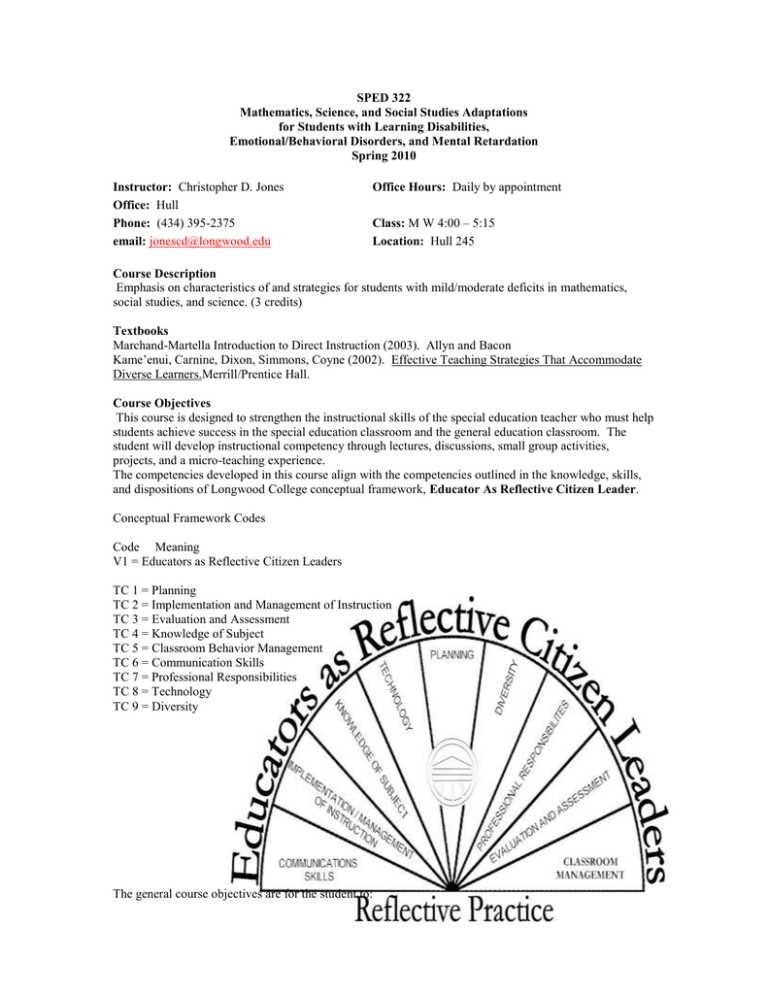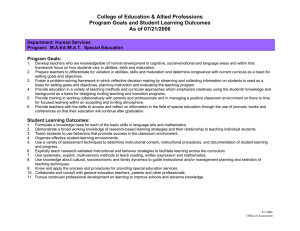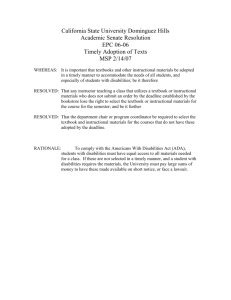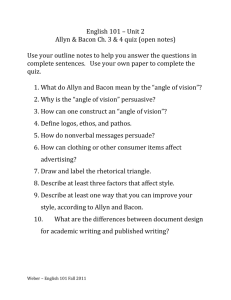SPED 322
advertisement

SPED 322 Mathematics, Science, and Social Studies Adaptations for Students with Learning Disabilities, Emotional/Behavioral Disorders, and Mental Retardation Spring 2010 Instructor: Christopher D. Jones Office: Hull Phone: (434) 395-2375 email: jonescd@longwood.edu Office Hours: Daily by appointment Class: M W 4:00 – 5:15 Location: Hull 245 Course Description Emphasis on characteristics of and strategies for students with mild/moderate deficits in mathematics, social studies, and science. (3 credits) Textbooks Marchand-Martella Introduction to Direct Instruction (2003). Allyn and Bacon Kame’enui, Carnine, Dixon, Simmons, Coyne (2002). Effective Teaching Strategies That Accommodate Diverse Learners.Merrill/Prentice Hall. Course Objectives This course is designed to strengthen the instructional skills of the special education teacher who must help students achieve success in the special education classroom and the general education classroom. The student will develop instructional competency through lectures, discussions, small group activities, projects, and a micro-teaching experience. The competencies developed in this course align with the competencies outlined in the knowledge, skills, and dispositions of Longwood College conceptual framework, Educator As Reflective Citizen Leader. Conceptual Framework Codes Code Meaning V1 = Educators as Reflective Citizen Leaders TC 1 = Planning TC 2 = Implementation and Management of Instruction TC 3 = Evaluation and Assessment TC 4 = Knowledge of Subject TC 5 = Classroom Behavior Management TC 6 = Communication Skills TC 7 = Professional Responsibilities TC 8 = Technology TC 9 = Diversity The general course objectives are for the student to: Knowledge: 1. Recognize the learning and social characteristics of children and youth with learning disabilities, emotional/behavioral disorders, and mild mental retardation and the implications of these characteristics for classroom instruction. TC 2, TC 4, TC 7 2. Recognize the six major principles of effective instructional tools. TC 4 3. Recognize the role of mnemonics instruction in content course instruction TC 2, TC 4 4. Recognize the “best practices” in Mathematics instruction. TC 2, TC 3, TC 4 5. Recognize the “best practices” in Science instruction. TC 2, TC 3, TC 4 6. Recognize the “best practices” in Social Studies instruction. TC 2, TC 3, TC 4 Skills: 1. Show skills in designing instruction, selecting, modifying, or adapting instructional materials and procedures, and assessing and evaluating student performance in mathematics, social studies, and science to meet the needs of students with learning disabilities, emotional/behavioral disorders, and mild mental retardation. (#1, #2, #3) TC 1, TC 2, TC 3, TC 4 2. Demonstrate mastery of script construction utilizing the six major principles of effective instructional tools and little di lesson plans. TC 1, TC 2, TC 3 3. Master the delivery of effectively design instruction. TC 2, TC 6 4. Develop an appreciation of the difference between an “amateur” teacher and a “professional” teacher. TC 7 5. Understand the role of assessment in curriculum delivery. TC 3 Dispositions: 1. Establish a philosophy of the educational goals, objectives, and instructional practices appropriate for students with learning disabilities, emotional/behavioral disorders, and mild mental retardation in the mathematics, social studies, and science curricula. V1, TC 7, TC 9 2. Actively exhibit qualities associated with a professional teacher TC 7 3. Embrace the philosophy of “letting the data guide instruction.” TC 3, TC 7 4. Actively pursues methods deemed “best practice.” V1, TC 3, TC 6, TC 7 Course Requirements 1. Students are expected to attend all class sessions and complete all reading assignments by the date due. There will be two tests (30 percent) and one final exam (10 percent) covering material from assigned readings and from class sessions. 2. Curriculum Review Rubrics (3): Develop a curriculum review rubric that culminates with a quantitative score. Each student will design a rubric to be used in curriculum adoption or construction that evaluates the effective delivery of the six major principles of high-quality educational tools. 3. Web Quizzes: Each web quiz is to be completed prior to attending class. The quiz will correlate with the daily reading requirement. You should read the chapter before attempting to take the quiz. Grading (Rubrics for all assignments will be posted on Blackboard.) Assignment Date Due Tests 2/25 – 3-31 Curriculum Adoption Rubric 3 Various Dates Web Quizzes Various Participation/Attendance Rolling Final Exam TBA Total Points Percent 30 30 15 15 10 100 Grading Scale: A 100-96 B C D F 95-89 88-83 82-77 >77 Attendance Policy Students are expected to attend all class sessions. If you must be absent for legitimate purposes (i.e., death in the family, a college-sponsored activity, or a recognizable illness or emergency),notify the instructor before the class session in question whenever possible. A grade of “F” will be assigned if you miss more that 25% of the class sessions for any combination of excused and unexcused absences. If you miss more than 10% of the class sessions for unexcused absences, your grade may be lowered by one letter. Honor Code Students are expected to abide by the Longwood College Honor Policy. All assignments and tests must be pledged. Accommodations Any student who feels that he or she may need accommodations based on a disability should make an appointment to see the instructor. Selected Bibliography Gurganus, S. P. Math Instruction for Students with Learning Problems. (2007). Boston: Allyn & Bacon Strichard, S. S., & Mangrum, C. T. (2002). Teaching Learning Strategies and Study Skills to Students with Learning Disabilities, Attention Deficit Disorders, or Special Needs. Boston: Allyn & Bacon Mastropieri & Scruggs (2002). The Inclusive Classroom: Strategies for Effective Instruction. Mastropieri & Scruggs (2002). Effective Instruction for Special Education. Pro Ed Silbert, Carnine (2002). Designing Effective Mathematics Instruction: A Direct Instruction Approach. Schloss, P. J., Schloss, M. A., & Schloss. C. N. Instructional Methods for Secondary Students with Learning and Behavior Problems (4th ed.) (2007). Boston: Allyn & Bacon




